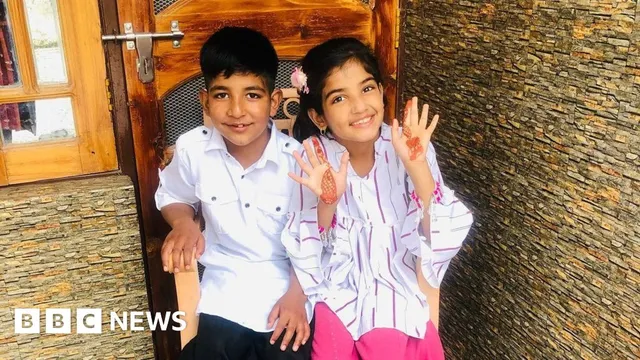
Twins killed in shelling highlight dangers of living near India-Pakistan border
2025-05-15 23:32- The tragic incident occurred on May 7, 2025, during intense cross-border shelling along the LoC.
- The twins' parents were also injured and are currently hospitalized, unaware of their children's deaths.
- There is a pressing need for safer living conditions for civilians along the India-Pakistan border.
Express your sentiment!
Insights
In Indian-administered Kashmir, intense conflict erupted around May 7, 2025, due to heightened tensions between India and Pakistan. The hostilities were marked by cross-border shelling, which resulted in the tragic deaths of 12-year-old twins, Zain Ali and Urwa Fatima, who were caught in an explosion near their school in Poonch. Their parents, Urusa and Rameez Khan, were also injured and hospitalized following the incident, which came in the wake of a retaliatory strike by India against targets in Pakistan after an earlier militant attack had killed 26 tourists in Indian territory. The incident starkly illustrates the vulnerability of civilians situated along the Line of Control (LoC) between the two nations, where the threat of violence is a constant reality. Living in this region means enduring a precarious existence, with families facing the daily risks associated with military actions that can escalate quickly. Past ceasefires have offered little assurance, as violations have frequently occurred, and the history of conflicts has continually impacted local communities. The foreign policies and military strategies of both countries often overlook the human cost of these confrontations, focusing instead on territorial and political gains. Local voices, like that of Maria Khan, who lost her niece and nephew, call for greater human consideration in these political skirmishes, emphasizing the need for governments to prioritize the safety of civilians, especially in border areas. As tensions evolve, calls for peaceful resolutions and a sustainable outcome that protects the lives of those in Kashmir remain paramount. The tragic death of the twins serves as a powerful reminder of the necessity for dialogue to resolve underlying issues peacefully, ensuring that such heartbreaking events do not happen again.
Contexts
The history of the India-Pakistan conflict has its roots in the tumultuous events leading up to the partition of British India in 1947. The partition, which aimed to create two independent nations based on religious lines, resulted in widespread communal violence and mass migrations. Hindus and Sikhs migrated to India, while Muslims moved to Pakistan, leading to a humanitarian crisis with significant loss of life. The division was hastily implemented, and the boundaries between the two countries became a source of continuing tension. The princely state of Jammu and Kashmir, which was predominantly Muslim but ruled by a Hindu Maharaja, became a flashpoint for conflict shortly after partition. In October 1947, tribal militias from Pakistan invaded Kashmir, prompting the Maharaja to accede to India in exchange for military assistance, leading to the first Indo-Pakistani war in 1947-1948 and establishing the line of control that still divides the region today. The events that transpired during the first war laid the groundwork for enduring animosities between India and Pakistan. The United Nations intervened and called for a ceasefire, which divided Kashmir into areas administered by both countries but failed to resolve the territorial dispute. This conflict was compounded in subsequent years by nationalistic sentiments and state narratives that demonized the other side. In 1965, skirmishes along the borders led to the second Indo-Pakistani war, which similarly resulted in no significant territorial changes but reinforced existing grievances and hostility. The third major conflict occurred in 1971, when East Pakistan sought independence from West Pakistan, leading to the Bangladesh Liberation War. India intervened on humanitarian grounds, and the war culminated in a decisive victory for India and the independence of Bangladesh, further intensifying the animosity felt in Pakistan towards India. In the decades that followed, the conflict evolved with episodes of violence, military standoffs, and nuclearization by both nations. In 1998, both India and Pakistan conducted nuclear tests, marking the South Asian region's entry into the nuclear age and altering the dynamics of their conflict. The Kargil Conflict in 1999 was one of the most notable episodes post-nuclearization, where both countries engaged in high-altitude warfare. This incident highlighted the persistent unresolved issues surrounding Kashmir and tested the limits of both nations' military strategies. Additionally, the ongoing insurgency in Kashmir has further complicated relations, with both countries accusing each other of supporting terrorism. In recent years, the India-Pakistan relations have been marked by sporadic dialogues and ceasefire agreements, but underlying tensions remain emblematic of the unresolved Kashmir issue. The rise of nationalism in both countries has complicated diplomatic efforts, often leading to increased hostility, especially in the context of events such as the Pulwama attack in 2019. The continued military presence along the Line of Control and periodic skirmishes underscore a volatile peace, while diplomatic engagements remain fraught with challenges. The international community continues to advocate for dialogue as a means to resolve the conflict, emphasizing the necessity for sustainable peace in the region.